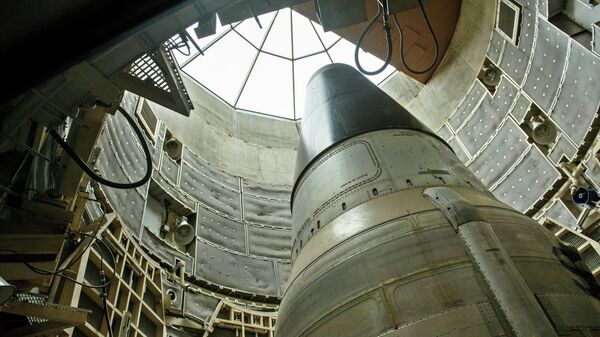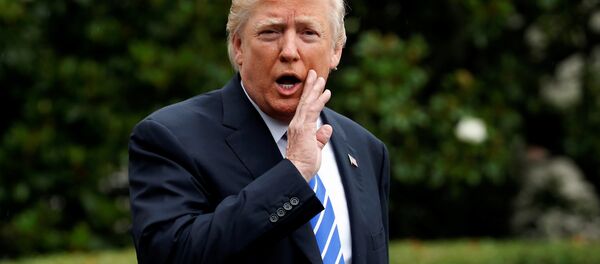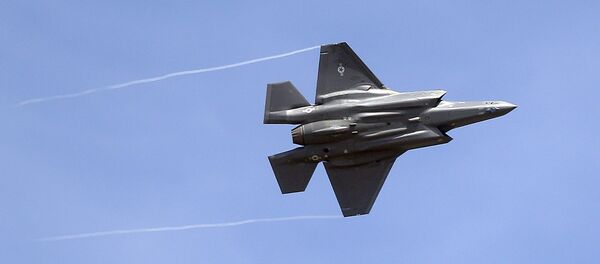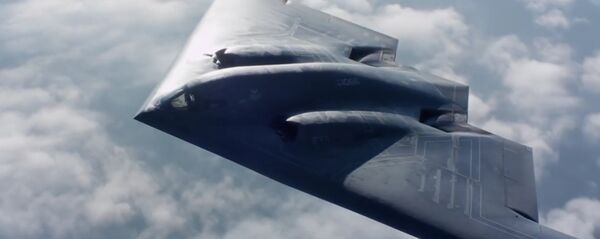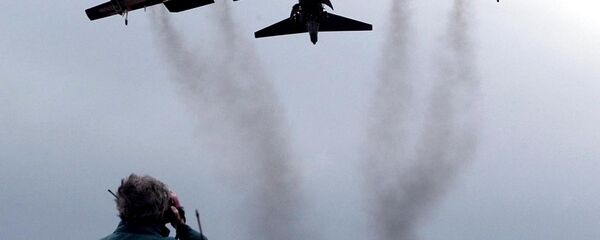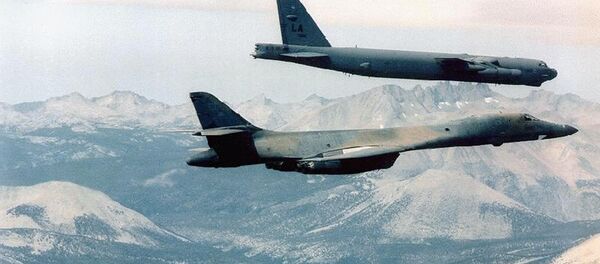On Friday, senior State and Defense Department officials held a press conference to rollout the NPR, a 100-page document that was the result of a January 27, 2017 directive from US President Donald Trump which called on Defense Secretary James Mattis to conduct a review to "ensure a safe, secure, and effective nuclear deterrent that protects the homeland, assures allies and above all, deters adversaries."
Trump in a statement on Friday after the rollout said that after a year of "thorough analysis and careful deliberations across our government," the administration was announcing the conclusions of its findings.
"These conclusions are grounded in a realistic assessment of the global security environment, the need to deter the use of the most destructive weapons on earth, and our nation’s long-standing commitment to nuclear non-proliferation," Trump said in a statement released by the White House.
Phantom Menace
Meanwhile, the United States is using the alleged Russian threat to justify a hike in military spending and nuclear buildup, Russian Ambassador to the United States Anatoly Antonov told reporters in a comment on the new US Nuclear Posture Review.
"The problem is that the Americans are again using the Russian scare to justify the rise in military spending and the nuclear buildup," he said Friday. "We realize this comes from their desire to inject more money into the military industry sector, we know the price tag is enormous, trillions of dollars."
"I hope that in the very near future there will be meetings between Russian and American specialists, during which our Washington colleagues will find explanations for many unclear statements in these document," Antonov said Friday.
However, the newly released 2018 US Nuclear Posture Review raises questions and does not promise practical work, Russian Ambassador to the United States noted.
"We were able to get acquainted only with the publicly released part of the document, with the remarks made by [US Defense] Secretary [James] Mattis, but even these remarks raise questions," Antonov said Friday. "I think that the remarks, at least those I have seen, do not really encourage practical work."
The doctrine said Russia was developing at least two intercontinental range nuclear weapons systems, a hypersonic glide aircraft and a new nuclear-armed undersea torpedo, as part of its strategic weapons buildup. To counter this threat, the US military plans to quickly develop and deploy sea launched nuclear missiles to ensure a "prompt response option."
"A conclusion may be made that according to this new doctrine, today American diplomats can talk to their colleagues world wide from a position of strength," Antonov said Friday. "Of course, as a Russian diplomat, I want to say that we should not be talked to from the position of strength. We should not be spoken down to. And we should not be told what and how we should do smething."
Moreover, Anatoly Antonov rejected US accusations that Russia does not abide by the Intermediate-Range Nuclear Forces Treaty (INF), saying he was convinced the row over its implementation could be resolved by experts.
"I would like to state clearly and unambiguously that we are serious about adhering to our obligations under international agreements," he said in response to US accusations that Russia violated INF. "I want to say that this dialogue should be left to professionals, instead of mass media."
The Russian senior diplomat also stressed that Moscow would say it has met all the requirements of the Strategic Arms Reduction Treaty in a national assessment due in the coming days.
"By February 5, Russia and the US are to make national statements on how they adhere by the Strategic Arms Reduction Treaty," Antonov said Friday. "I am convinced that our national statement will say that Russia has met all requirements and figures stipulated by this treaty."
Modernizing Triad
Meanwhile, James Mattis explained in the preface that the review affirms efforts initiated under former President Barack Obama to modernize US nuclear ballistic missile submarines, strategic bombers, nuclear air-launched cruise missiles, intercontinental ballistic missiles (ICBMs), and command and control.
US Deputy Secretary of Defense Patrick Shanahan echoed this sentiment to reporters at a press conference unveiling the NPR.
"The 2018 NPR calls for modernizing the nuclear triad and command and control system — which is necessary, affordable and long overdue," Shanahan said on Friday.
At least 12 new Columbia-class strategic nuclear subs will replace the aging Ohio-class fleet. Also on the drawing board are plans to develop follow-on to the Trident II D-5, according to the report.
There are 46 nuclear capable B-52H and 20 nuclear capable B-2A strategic bombers in the US Air Force, the NPR said. The next generation B-21 Raider will begin replacing the older aircraft around 2025.
"The United States is also incorporating nuclear capability onto the F-35, to be used by the United States and NATO allies, as a replacement for the current aging DCA," the NPR said. "Improved DCA readiness and the arrival of the F-35, a fifth generation aircraft, in conjunction with the ongoing B61-12 gravity bomb, will maintain the strength of NATO’s deterrence posture and maintain our ability to forward deploy nuclear weapons, should the security situation demand it."
The NPR noted that the Long-Range Stand-Off (LRSO) cruise missile replacement program is underway. The LRSO will be carried aboard US strategic bombers. It will have the capability to sneak past integrated air defense systems while keeping aircraft out of harm's way.
Rivals
The review claims a stronger US nuclear deterrent is needed to discourage Russia, China, Iran and North Korea from either developing new weapons or expanding existing arsenals.
In the NPR's preface, Mattis said that Russian doctrine and its actions in Crimea, Ukraine and elsewhere have signaled Moscow’s intent to return to Great Power competition.
The report accuses Russia of adopting strategies that lower the threshold for first-use of nuclear weapons, which the Pentagon finds "troubling."
Acting Assistant Secretary of State for Arms Control, Verification and Compliance Anita Friedt told reporters on Friday that the United States briefed Russia on the rollout of Trump’s new nuclear strategy and tried to reassure that the review was not solely targeting Moscow.
"I would not call this a Russia-centric NPR… Russia is not the sole focus of this NPR by any means," Friedt said
Russia and the United States are working on scheduling another meeting on nuclear strategic stability, Friedt said.
After the rollout, a senior Russian lawmaker told Sputnik the NPR enables the United States to evade responsibility.
"The doctrine removes any responsibility from the US leadership for any actions, because it allows for a loose interpretation of events on the international arena and of the situation in the internal affairs of sovereign countries," Viktor Bondarev, Russian upper house Defense and Security Committee chairman, said.
The NPR claimed that China is developing new nuclear capabilities to challenge US military supremacy in the Western Pacific region. Beijing is also modernizing its Navy and ground forces, the report said.
"Iran has agreed to constraints on its nuclear program in the Joint Comprehensive Plan of Action (JCPOA)," the document said. "Nevertheless, it retains the technological capability and much of the capacity necessary to develop a nuclear weapon within one year of a decision to do so."
In several parts of the world, according to the report, there is an increased potential for regional conflicts involving nuclear-armed adversaries "and the potential for adversary nuclear escalation in crises or conflict."
"Despite concerted US efforts to reduce the role of nuclear weapons in international affairs and to negotiate reductions in the number of nuclear weapons, since 2010 no potential adversary has reduced either the role of nuclear weapons in its national security strategy or the number of nuclear weapons it fields. Rather, they have moved decidedly in the opposite direction," the report said.
Opposition
Several US lawmakers came forward to express disappointment with Trump’s strategy, including Senate Intelligence Committee Vice Chair Dianne Feinstein.
"Trump’s Nuclear Posture Review is deeply troubling and is a dangerous departure from past reviews," Feinstein said in a press release on Friday. "It lowers the threshold for using nuclear weapons, a particularly frightening proposition given this president’s support for a nuclear arms race."
US Senator Chris Murphy said in a statement that Trump has raised the threat of nuclear war with the latest posture review combined with his unstable personality.
"The policy laid out in the Trump administration’s Nuclear Posture Review reverses decades of bipartisan efforts to reduce the risk of nuclear war," Murphy said on Friday. "I’m afraid today we took a scary step backward from decades of nuclear disarmament and deterrent."
"@realDonaldTrump just released his new nuclear strategy, which calls for more nuclear weapons that are easier to use," Warren said in a tweet. "This flies in the face of decades of American leadership in building a safer world – one with fewer nuclear weapons."
In his first State of the Union address on Wednesday, Trump declared that the United States would move forward with its nuclear modernization efforts. Trump said that while global nuclear disarmament is a nice concept, the world is not yet ready for it.
Russian President Vladimir Putin said at the annual Defense Ministry Board meeting in December that the country’s nuclear forces are on a level which ensures reliable strategic deterrence, yet they must continue to develop the triad.

